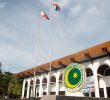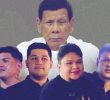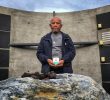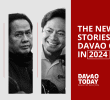The advocates of constitutional change, most especially former President Fidel Ramos, House speaker Jose De Venecia and President Gloria Macapagal-Arroyo, cannot claim to be sincere adherents of constitutional principles when their track record in governance says otherwise.
By the Policy Study, Publications and Advocacy (PSPA) Program
Center for People Empowerment in Governance (CenPEG)
MANILA — The advocates of constitutional amendment are in their last-ditch efforts to rush the approval of their project following the junking of their petition by the Commission on Elections (Comelec) last week. Considering the brains behind this exercise, their political motives and the means they have used to clinch their objective, all the more is there reason to oppose it and to shy way from complacency.
Movers of constitutional change (Cha-Cha), led by the embattled President Gloria M. Arroyo, former President Fidel V. Ramos and House Speaker Jose de Venecia, are now using the two-pronged tack to fast-track their project. Their frontliners, Sigaw ng Bayan and the Union of Local Authorities of the Philippines (ULAP), have appealed to the Supreme Court (SC) to annul the Comelec resolution dismissing their earlier petition to take cognizance of the “people’s initiative” for charter change. While awaiting the SC decision, Arroyo allies in the House are determined to convert Congress into a constituent assembly (Con-Ass) with or without the participation of the Senate. So far, they have succeeded in having the House committee on constitutional amendments to swiftly approve without discussion the Jaraula resolution seeking to convene Congress into a constituent assembly.
House allies of Arroyo stand to gain in a constitutional amendment that would pave the way for a parliamentary form of government. If Cha-Cha succeeds, they � as do local officials at their level – will retain their seats in the interim Parliament that would be constituted in January 2007 until the end of Arroyo’s term in 2010. It will also concentrate more powers in the current executive given the continuing control of resources and leverage by the office of the president in the transition period.
On the other hand, Arroyo will be saved from a possible third impeachment under the interim Parliament. Furthermore, there is no certainty that the party-list system will be retained. Leaving out the party list system from parliament will contribute to the further concentration of powers of the ruling party. This will also effectively deprive the progressive and patriotic elements from the party list system of a legislative arena where for the past five years they championed new politics and became adversarial to the narrow and self-serving interests of the political elite. But closing people’s representation in the legislature will also debunk the Cha-Cha drumbeaters’ claim to being the “people’s voice” as a sham.
The current efforts to amend the 1987 Constitution are an offshoot of a trade-off between Arroyo on the one hand and Ramos and De Venecia, on the other, that was sealed on the brink of the incumbent President’s imminent ouster late last year. Pressures mounted calling for Arroyo’s resignation over electoral fraud in the 2004 elections until Ramos came to her “rescue” in exchange for giving her full support to Cha-Cha. This confluence of interests led to the barefaced murder by the ruling coalition party in the House of the impeachment charges against Arroyo last year and again in August this year.
Thus since the very beginning the move to amend the constitution has been fraught with secret deals, questionable intent and cutting corners that cannot even stand the ethical and legal requisites of a legitimate constitutional change. For instance, the “people’s initiative” for constitutional change that was purportedly signed by 10 million individuals has been exposed to contain forged signatures including names of deceased persons. The presidential office has also been asked to explain the reported use of government funds to finance the “people’s initiative” thus belying claims by Sigaw ng Bayan and ULAP that it is an independent grassroots initiative. ULAP is not a people’s organization but a consortium of local government executives who were promised electoral funds in the guise of development aid.
That the constitutional amendment, as claimed by its advocates, is designed for effective governance and economic development is obviously just a spin that has long been dismissed as a pure hogwash by people’s protests and the electorate in countless opinion surveys. Most Filipinos have seen through the political stench at the back of Cha-Cha since it was first launched by Ramos and company in the early 1990s: for the ruling politicians to extend their term and remain in power and to do away with all protectionist provisions thus favoring the full foreign domination of the country’s economy. Constitutional amendment is being passed on like a silver bullet that will solve everything when in the first place its proponents and other like-minded traditional politicians are the ones responsible for the mess our country is in now.
The advocates of constitutional change, most especially Ramos, De Venecia and Arroyo, cannot claim to be sincere adherents of constitutional principles when their track record in governance says otherwise. De Venecia, a close Marcos crony, was charged during the Aquino presidency in connection with the Marcos ill-gotten wealth. It has been under his House leadership when controversial bills were enacted through alleged pay-offs and other dirty deals. Ramos and Arroyo mangled the constitution several times when they pushed for or signed various trade and globalization policies, the oil deregulation law, Visiting Forces Agreement, the mining act and other measures that proved to be inimical to the national interest.
This time around, Arroyo, Ramos and De Venecia further unmask themselves as political thugs by circumventing the constitutional process in their desperate bid to stay in power.
(The Center for People Empowerment in Governance (CenPEG) is a public policy center established shortly before the May 2004 elections to help promote people empowerment in governance specially the democratic representation of the marginalized poor.)










